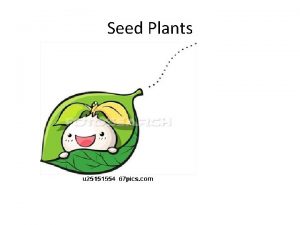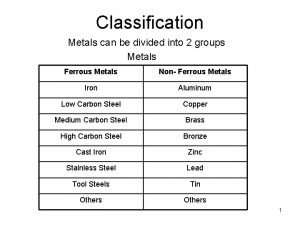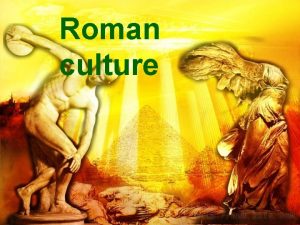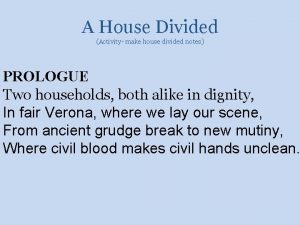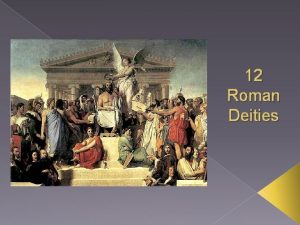Roman History Roman History is divided up into




















- Slides: 20

Roman History • Roman History is divided up into 3 periods – Monarchy - Republic - Empire • Each period’s title comes from the form of government used at the time. • The Romans are most known for their military achievements, architectural mastery and influence in language and Western culture

The Monarchy • Dates from 753 BC – 509 BC • There were 7 kings – Romulus was the first • Legendary founding story – Romulus and Remus – raised by a she-wolf • Romulus wins out – city called Rome after himself – not many people there – needed to increase population • Invites “undesirables” in • Eventual conquering of surrounding areas

Monarchy continued • Romulus creates Campus Martius for the training of soldiers – in honor of his father • Has lictors who guard him – they carry the “fascēs” which was a symbol of power • Eventually the Etruscans assimilate • Other kings: 2 nd – Numa Pompilius – set up religion 3 rd – Tullius Hostilius – destroyed Alba Longa 4 th – Ancus Martius – built a bridge over Tiber 5 th – Tarquinius Priscus – set up Forum 6 th – Servius Tullius – set up city wall; political assembly for voting • 7 th king - Tarquinius Superbus is overthrown because of his tyranny – he did set up a sewer system and many public buildings but his overall nasty disposition and desire for absolute power did not sit well with certain citizens

7 Hills • Palatine • Capitoline • Aventine • Esquiline • Viminal • Caelian • Quirinal


End of the Monarchy – Start of the Republic • Tarquinius Superbus is overthrown – revolt is led by Brutus – he becomes first consul • The Republic – 509 BC – 27 BC • A time of conquest – gathering territory and expanding population, especially in Italy • Many wars – foreign enemies - mainly Carthage • From 100 BC – 27 BC – 3 civil wars take place

Carthage & the Punic Wars • 1 st Punic War – 264 BC – 241 BC over the island of Siciliy – both wanted it for trade purposes • Various battles took place over a 20 -year period – eventually Rome prevailed and imposed harsh sanctions • Carthaginians were not allowed to have a navy, could only have an army to defend their immediate borders, had to give money to the Romans, and were not allowed to trade with other nations.

The Punic Wars (cont) • 2 nd Punic War – 218 BC – 201 BC • Hannibal, a Carthaginian general, grew up hating the Romans because of the sanctions • He led a campaign against the Romans that was almost successful – after defeating the Roman army numerous times, he was finally defeated by Scipio, who received the title “Africanus” for his victory over the Carthaginians. • Even more harsh sanctions were put in place after this war. Carthage was quiet until 149 BC.

The Punic Wars (last one) • 3 rd Punic War – 149 BC – 146 BC • Carthage tried to defend the city against an outside foe and they started up their army again – a major violation of the sanctions • The Romans crushed the city and left nothing behind – those who weren’t killed were enslaved and the city was plowed under


Other people in the Republic • Cato the Elder – prominent just before the 3 rd Punic War – always ended speeches with “Carthago delenda est”; never got to see the city destroyed • Cicero – a prominent senator, speech maker and writer – his letters give us a day by day account of what happened in Rome at its most turbulent time - he’ll be important during Latin III

Civil Wars • 1 st Civil War – between Marius and Sulla – Marius was a general and Sulla under his command negotiated a surrender but Marius took the credit – bad blood In 88 BC, Sulla was consul and Marius was given command of the army – Sulla was upset – war starts. Marius dies and Sulla defeats the rest of his army a few years later

Caesar Cicero Pompey Cato the Elder

Civil Wars (cont) • In 60 BC, Caesar, Pompey and Crassus form the 1 st Triumvirate – they are all powerful men – • 2 nd Civil War – 49 BC -48 BC between Julius Caesar and Pompey the Great – Caesar conquered vast amounts of territory in Gaul from 58 BC – 50 BC and wanted to run for the consulship in 49 – Pompey convinced the senate not to let him run – • Caesar gets angry and crosses the Rubicon River with his army, committing treason – he says, “The die is cast” (Alea iacta est) • He defeats Pompey’s forces at the Battle of Pharsalus in 48 BC – Pompey flees to Egypt and his beheaded there by an ally of Caesar’s.

Caesar • With Pompey out of the way, Caesar goes to Rome and becomes consul in 46 • In 45, he is made dictator for a period of 6 months to squelch an uprising; he does so and then declares himself “dictator for life” • A group of senators are uncomfortable with Caesar trying to gain so much power • They conspire to kill him and he is assassinated on the Ides of March (March 15 th ) in 44 BC • In his will, he adopts his grand-nephew, Octavian, as his heir

Rise of Octavian • Octavian comes to Rome to claim his inheritance – “a mere boy, owing everything to a name” – the name gave him some power and followers • He was only 19 years old – demands to be elected consul and wants to avenge his father’s death • Brutus and Cassius, the main conspirators, leave Rome – fearing unpopularity • Octavian allies himself with Marcus Antonius – an already established general and leader • They join up with Lepidus to form the 2 nd Triumvirate • Antonius and Octavian defeat the forces of Brutus and Cassius at the Battle of Philippi in 42 BC

Rise of Octavian (cont) • Both Antonius and Octavian gain popularity and tension ensues – Treaty of Brundisium - 40 BC • Antonius tries to set up Octavian by making him settle all the soldiers – a difficult task • Eventually there is a split – Antonius goes to the East to get riches and gain power – meets Cleopatra and they unite against Octavian • Octavian creates propaganda that Antonius has become a traitor – gains support • Defeats the forces of Antonius and Cleopatra at Battle of Actium in 31 BC

Octavian becomes Augustus • In 27 BC – Senate gives him the title “Augustus” – “revered” • Under his 40 year reign, Rome enjoys a time of peace and prosperity – the arts and writing flourish – buildings are restored – new laws are established • It is called the Pax Romana • He rules from 27 BC until his death in 14 AD • His stepson, Tiberius, becomes second emperor

Other emperors • Julio-Claudian Family – Caligula – tries to make horse a senator Claudius – conquers Britain Nero – most known for letting part of city burn down during a fire • Flavian Dynasty – build the Colosseum in 80 AD • Antonine Dynasty – Marcus Aurelius, Trajan and Hadrian are major emperors • The Emperor Constantine changes religion to Christianity in the early 300 s AD and moves the capital to Constantinople, which seriously weakens the western empire • Empire falls in 476 AD with the sack of the city of Rome by the Goths, Visigoths and Vandals from Northern Europe

 Egyptian history is divided into
Egyptian history is divided into History is divided into
History is divided into Latin verbs are divided into
Latin verbs are divided into The gsm network is divided into
The gsm network is divided into System software is divided into how many parts
System software is divided into how many parts Plants can be divided into two groups
Plants can be divided into two groups Into what parts is scotland divided geographically
Into what parts is scotland divided geographically Layers of the earth song
Layers of the earth song India can be divided into how many natural regions.
India can be divided into how many natural regions. Aca student liability insurance
Aca student liability insurance Theme
Theme Israel divided into two kingdoms
Israel divided into two kingdoms Multistory building divided into crowded apartments
Multistory building divided into crowded apartments The bluest eye motifs
The bluest eye motifs Two plates spread or move apart at what boundary
Two plates spread or move apart at what boundary Paris is divided into 20 arrondissements
Paris is divided into 20 arrondissements Macrominerals
Macrominerals List two main groups into which metals can be divided
List two main groups into which metals can be divided Israel divided into two kingdoms
Israel divided into two kingdoms The smallest particle an element can be divided into is the
The smallest particle an element can be divided into is the How are anions divided into groups
How are anions divided into groups





